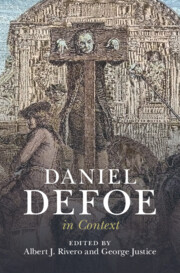Book contents
- Daniel Defoe in Context
- Daniel Defoe in Context
- Copyright page
- Contents
- Illustrations
- Notes on Contributors
- Preface
- Acknowledgements
- Chronology
- Part I Life and Works
- Part II Literary Context
- Chapter 6 Defoe and the Novel
- Chapter 7 Defoe and Popular Fiction
- Chapter 8 Verse and Verse Satire
- Chapter 9 Memories and Memorials
- Chapter 10 Periodicals, News, and Journalism
- Chapter 11 Defoe and Pornography
- Chapter 12 Defoe and Popular Religious Writing
- Chapter 13 Theatre and the Novel
- Chapter 14 The Philosophical Tradition
- Part III Authorship and Copyright
- Part IV The Monarchy and Parliament
- Part V Social Structures and Social Life
- Part VI Critical Fortunes and Literary Afterlife
- Further Reading
- Index
Chapter 8 - Verse and Verse Satire
from Part II - Literary Context
Published online by Cambridge University Press: 27 April 2023
- Daniel Defoe in Context
- Daniel Defoe in Context
- Copyright page
- Contents
- Illustrations
- Notes on Contributors
- Preface
- Acknowledgements
- Chronology
- Part I Life and Works
- Part II Literary Context
- Chapter 6 Defoe and the Novel
- Chapter 7 Defoe and Popular Fiction
- Chapter 8 Verse and Verse Satire
- Chapter 9 Memories and Memorials
- Chapter 10 Periodicals, News, and Journalism
- Chapter 11 Defoe and Pornography
- Chapter 12 Defoe and Popular Religious Writing
- Chapter 13 Theatre and the Novel
- Chapter 14 The Philosophical Tradition
- Part III Authorship and Copyright
- Part IV The Monarchy and Parliament
- Part V Social Structures and Social Life
- Part VI Critical Fortunes and Literary Afterlife
- Further Reading
- Index
Summary
This chapter considers major aspects of Defoe’s output in verse, touching on his debt to influential predecessors from the Restoration era, where his most important models were Andrew Marvell, Samuel Butler, and John Dryden. A discussion follows of characteristic poems that exhibit various modes of satiric writing, including ballads and quasi-Pindaric items such as A Hymn to the Pillory (1703) and The Vision (1706); allusive productions in the fashionable form of heroic couplets, such as The Mock Mourners (1702) and The Dyet of Poland (1705); and his longest poem, Jure Divino (1706), labelled a satire, but centrally an exercise in political theory. The discussion culminates in an analysis of the most successful work in the canon, a biting interrogation of nationhood, The True-Born Englishman (1701), with an exploration of the methods by which Defoe undermined the Little Englander rhetoric of his principal target, the journalist John Tutchin.
- Type
- Chapter
- Information
- Daniel Defoe in Context , pp. 62 - 69Publisher: Cambridge University PressPrint publication year: 2023

